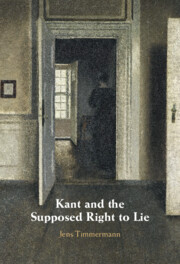Book contents
- Kant and the Supposed Right to Lie
- Kant and the Supposed Right to Lie
- Copyright page
- Dedication
- Contents
- Preface
- A Note on Texts and Translations
- Abbreviations
- Chapter I Introduction
- Chapter II Kant’s Duties of Truthfulness
- Chapter III The Story of Kant’s Essay
- Chapter IV Theoretical Foundations, Supposed Solutions
- Chapter V The Intricacies of Constant’s Example
- Chapter VI A Right to the Truth in Another?
- Chapter VII Form and Matter
- Chapter VIII Kant’s Argument against Constant
- Chapter IX Luck and the Imputation of Harm
- Chapter X What Kant Should Have Said
- Appendix “On a Supposed Right to Lie”: Text and Translation
- Bibliography
- Name Index
- Subject Index
Chapter VI - A Right to the Truth in Another?
Published online by Cambridge University Press: 18 July 2025
- Kant and the Supposed Right to Lie
- Kant and the Supposed Right to Lie
- Copyright page
- Dedication
- Contents
- Preface
- A Note on Texts and Translations
- Abbreviations
- Chapter I Introduction
- Chapter II Kant’s Duties of Truthfulness
- Chapter III The Story of Kant’s Essay
- Chapter IV Theoretical Foundations, Supposed Solutions
- Chapter V The Intricacies of Constant’s Example
- Chapter VI A Right to the Truth in Another?
- Chapter VII Form and Matter
- Chapter VIII Kant’s Argument against Constant
- Chapter IX Luck and the Imputation of Harm
- Chapter X What Kant Should Have Said
- Appendix “On a Supposed Right to Lie”: Text and Translation
- Bibliography
- Name Index
- Subject Index
Summary
This chapter scrutinises the framework within which Kant decides to conduct his argument against Constant. Constant argues that the would-be murderer has forfeited his right to be told the truth. Kant argues that the duty to be truthful does not depend on that kind of right; that Constant fails to distinguish between truth and truthfulness with sufficient care; and that one should distinguish the question of whether lying is permissible (licence to lie) in emergencies from the question of whether lying is ever morally required (obligation to lie). In the 1797 essay, Kant addresses the second question through the first. If there is never a licence to lie, there can be no obligation to do so.
Information
- Type
- Chapter
- Information
- Kant and the Supposed Right to Lie , pp. 98 - 106Publisher: Cambridge University PressPrint publication year: 2025
